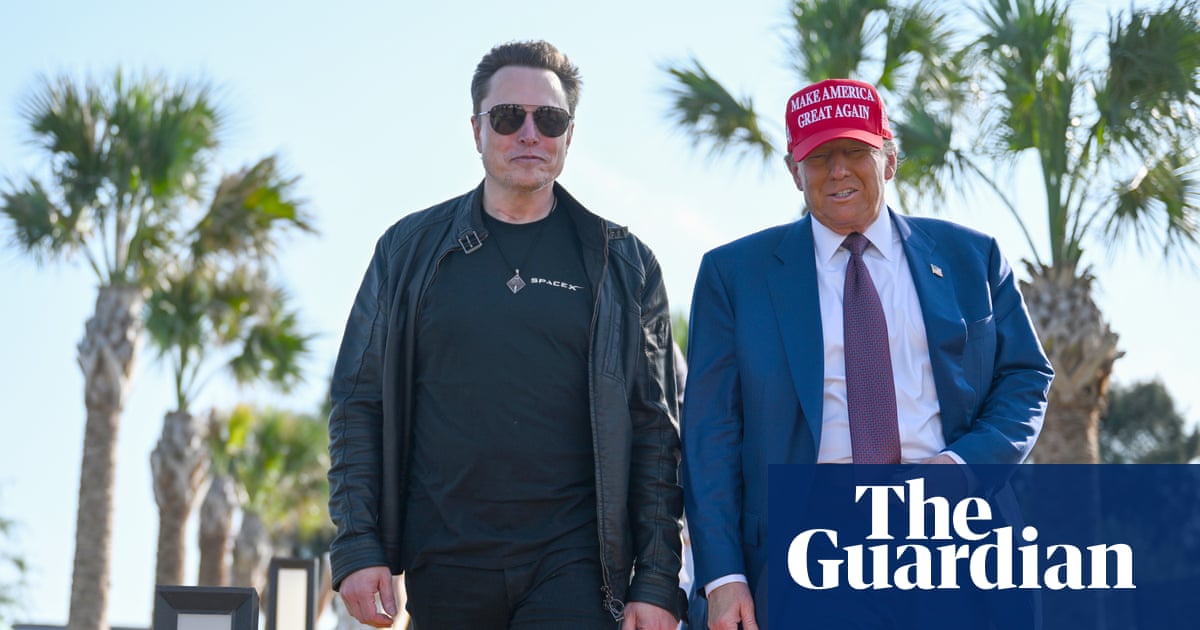The millions that US tech companies invested in currying favor with Donald Trump seemed to pay off this week as the new administration issued a flurry of directives that relaxed regulations and dropped lawsuits previously aimed at holding the industry to account. Crypto, AI and social media companies, many of which made donations to Trump, are all expecting to benefit.
At the center of the administration’s moves is Elon Musk, the world’s richest man. Over the past week, federal agencies under the president’s authority dropped legal fights against his rocket company and the US’s biggest cryptocurrency exchange. The White House also issued a “deregulatory initiative” aimed at loosening tech-sector regulation by empowering Musk’s Doge.
Musk is the CEO of several tech companies that have been sued by federal agencies in recent years. The billionaire CEO poured nearly $300m into the president’s re-election campaign and now is in charge of the Department of Government Efficiency (Doge), which is tasked with cutting federal spending and regulations.
The administration’s moves fall into a pattern of friendliness towards the tech industry and its billionaire leaders.
On Friday, Coinbase said the Securities and Exchange Commission had communicated plans to dismiss its lawsuit against the cryptocurrency exchange. The same day, the justice department announced that it was dropping its discrimination case against Musk’s SpaceX.
Trump is also cutting regulatory safeguards on artificial intelligence, which Silicon Valley CEOs have long said are overly burdensome. The body charged with testing the safety of cutting-edge AI models is bracing for layoffs after probationary employees received notice Wednesday. Two weeks ago, the White House rolled back an executive order by Joe Biden meant to ensure AI safety.
Silicon Valley has cozied up to Trump
In addition to Musk, several other tech CEOs have also found favor with Trump, including Apple’s Tim Cook, Amazon’s Jeff Bezos, Google’s Sundar Pichai, Meta’s Mark Zuckerberg, OpenAI’s Sam Altman and TikTok’s Shou Zi Chew. They all donated $1m to Trump’s inaugural committee and have had closed-door meetings with the president.
In the early days of the first Trump administration, some tech companies had contentious relationships with the president. They protested against his initiatives, including a ban on immigration from seven Muslim-majority countries and his stance on abortion. With Trump’s second time around, things have changed.
“The striking image at the inauguration of so many leaders in attendance who had taken more aggressive stances towards Trump in his first term shows that they hope for more favorable treatment,” said Gautam Hans, law professor and director of the Civil Rights and Civil Liberties Clinic at Cornell. He added that Trump’s recent actions on the tech front “reflect a litany of long-term conservative grievances and aggressive deregulatory arguments”.
Coinbase notches a win after donating to Trump
A month before the SEC dropped its suit against Coinbase, the crypto company donated $1m to Trump’s inaugural fund, a move many tech companies and their CEOs made to cozy up to Trump. The crypto industry writ large supported a wide swath of Republican candidates, and Trump’s re-election sparked a rally in crypto prices.
“SEC staff has agreed in principle to dismiss its unlawful enforcement case against Coinbase, subject to commissioner approval – righting a major wrong,” Paul Grewal, the company’s chief legal officer, wrote in a blogpost. “We’ve always maintained that we were right on the facts and the law, and today’s announcement confirms that this case should never have been filed in the first place.”
The SEC sued Coinbase in 2023, alleging the exchange traded 13 tokens that should have been registered with the SEC as securities. But the Trump administration is taking a friendlier approach to crypto. On the campaign trail, Trump said he would be the “crypto president” and nominated crypto-friendly commissioner, Paul Atkins, to lead the SEC, replacing Gary Gensler, who took an adversarial stance towards the industry.
The decision to withdraw lawsuits against companies such as Coinbase is not unexpected. In the first few weeks of the new administration, the SEC established a crypto taskforce that experts expect will review and possibly reverse the previous administration’s policies and cases.
Consumer protection advocacy group Public Citizen says the SEC’s decision would be “proof positive that the crypto industry’s flood of campaign spending has paid off”.
“The now-abandoned lawsuit against Coinbase involved the most basic assertion of SEC authority: Coinbase cryptocurrency offerings are actually securities and must be registered and regulated as such,” Public Citizen co-president said in a statement.
“Retreat from this basic assertion is a massive gift to the industry, which can only be understood in light of its massive political spending in the last election.”
Trump issues order that empowers Musk and Doge
Trump signed a sweeping executive order on Wednesday aimed at cutting back on regulations. The order, called a “deregulatory initiative” in a White House press release, directly echoes Musk and Doge’s stated mission to cut federal spending and regulations – and could greatly benefit the tech industry.
The order will “commence the deconstruction of the overbearing and burdensome administrative state”, the order reads. “Ending federal overreach and restoring the constitutional separation of powers.”
The order dictates that Doge, along with the director of the office of management and budget, will “rescind unlawful regulations” by going through a review process that examines “all regulations”. The timeline to do this is 60 days. The list of “unlawful regulations” is expansive and includes regulations that give too much power to Congress, impose significant costs on private parties, and that impede tech innovation.
after newsletter promotion
Silicon Valley has long complained about the federal government’s regulations, many of which are aimed at anti-competitive and monopolistic behavior and impose labor and consumer safety standards. Google, Apple and Meta have been sued by the justice department in antitrust and discrimination cases. And the Federal Trade Commission has brought suits against many of those same companies, along with Amazon, Uber and Snapchat.
Some lawyers are questioning the legality and feasibility of this new deregulatory executive order.
“If Trump thinks Doge is going to be able to just cancel regulations under these vague criteria the way it has attempted to just cancel agencies, he’s going to be disappointed,” said Daniel Walters, an associate law professor at Texas A&M University.
“There’s a little law called the Administrative Procedure Act standing in the way.”
The Administrative Procedure Act requires agencies to rescind existing regulations through the same process as creating regulations, Walters said. These processes can take years and existing regulations are considered binding until they’re complete.
Deregulating AI
Administration officials have repeatedly signaled their belief that previous administrations have over-regulated the technology industry and created obstacles to innovation, especially with regards to AI. Vice-President JD Vance started a speech at the global AI Action Summit by emphasizing the administration’s focus on “AI opportunity” rather than “AI safety”.
“We believe that excessive regulation of the AI sector could kill a transformative industry,” Vance said at the conference.
Trump has already made several moves to gut the guardrails around the development and use of AI that the Biden administration put in place. Shortly after taking office, Trump rescinded a sweeping AI executive order that Biden issued to ensure AI would be used and developed safely. Trump called the order a “barrier to American leadership in artificial intelligence”.
Now, the non-regulatory body that was charged with testing the industry’s most-powerful AI models is facing layoffs. About 500 probationary employees of the National Institute of Standards and Technology, which establishes standards of safety and reliability for various sectors including AI, manufacturing and cybersecurity, are expecting to be fired, according to multiple reports. Some of those employees received verbal notices as of Wednesday, according to Bloomberg. Members of the AI Safety Institute (AISI), which was created within the NIST in response to Biden’s AI executive order, are particularly concerned they will be fired, according to Wired.
Eliminating the AISI would do nothing to make American AI companies more competitive and would instead “undermine efforts” to ensure AI tools are safe, according to Alexandra Reeve Givens, the chief executive of digital rights non-profit the Center for Democracy and Technology.
“The AI Safety Institute was designed to play a basic, common-sense role coordinating the kind of work that needs to happen for the entire industry to succeed,” Givens said in a statement.
The FTC’s threats
Though Trump has thus far made tech-friendly moves, his administration is also using its regulators to make threats against the tech industry, should Silicon Valley CEOs stop being so close to the president. The new chair of the Federal Trade Commission, Andrew Ferguson, went on Elon Musk’s X on Thursday with a promise to go after “big tech censorship” saying it’s “un-American” and “potentially illegal”.
He launched an official inquiry into the matter, which will scrutinize how tech platforms may be banning or shadow banning various users. Trump was temporarily banned from Twitter, Facebook and YouTube after the January 6 attack on the Capitol.
“Tech firms should not be bullying their users,” Ferguson said in a statement.
Article by:Source: Dara Kerr and Johana Bhuiyan














